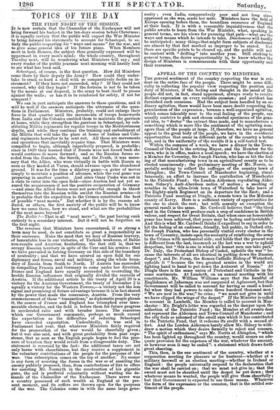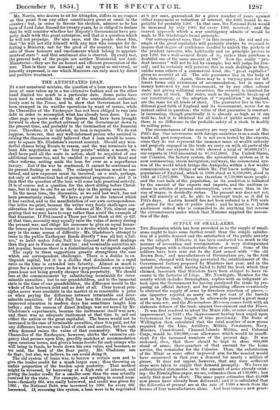APPEAL OF THE COUNTRY TO MINISTERS:
THE general sentiment of the country respecting the war is evident on the entire face of the people. There might be some difficulty in collecting the popular view respecting the position and duty of Ministers' if the feeling and thought in the mind of the people did not, it, fact, stand uppermost, always ready to receive distinct expression on every suitable occasion; and accident has furnished such occasions. Had the subject been handled by an ordinary agitation, there would have been more doubt respecting the genuineness of the expression; because a well-organized agitation, which comes tolerably near to the real feeling of the people, can usually contrive to pack and choose selected specimens of the general idea, to "(lector " the extract thus made, and to manufacture a something which is more Eke the sentiment of the agitating managers than of the people at large. If, therefore, we have no. general appeal to the great body of the people we have in the accidental opportunities that occur in different Parts of the country a better test, and in the uniformity of the results it is a self-tested test.
Within the compass of a week, we have a caner in the TownCouncil of Oxford to the retiring Mayor, and. the Member for the town, who is in office, makes a local speech ; we have the election of a Member for Coventxy, Sir Joseph Paxton, who has so hit the feeling of that manufacturing town in an agricultural county as to be elected unanimously; the preliminary meeting of Mr. Norris', especially seeking to collect the suffinges of the country town of Abingdon; the Town-Connell of Manchester beginning, simultaneously, an effbrt to increase the contribution of Manchester to the Patriotic Fund ; the tendon Aldermen, repudiating Alderman Sidney's Anti-Aberdeen notice of motion ; n meeting of notables in the ultra-Irish town of Waterford to take leave of the Eighty-ninth Regiment on its departure for the East ; and a Patriotic Fund meeting at Dingle a remote town in. the Milesian county of Kerry. Here is a sufficient variety of opportunities for the one to check the rest; bat with scarcely an exception the general result is the same. Mr. Cardwell believes that "the blood shed in the Crimea.will produce such a crop of confidence in British valour, .and! respect for Great Britain, that when once an honourable peace has been achieved, that peace may be lasting and inviolable." And this is what Mr. Cardwell thinks it expedient to say in order to hit the feeling of an audience, friendly, but public, in Oxford, city. Sir Joseph Paxton, who has personally visited every elector in the town of Coventry-, insists upon the necessity of reinforcing the army in the Crimea 'with. mechanical aids; and holds that the present war is diiThrent from the last, inasmuch as the last was a war to uphold despotism, but "this is one in which all honest men. can take part." Dr. Daly, the Protestant Bishop of Cashel„ upholds the war " because the interests of all are identical in putting down the Russian despot"; and Dr. Foran, the Roman Catholic Bishop of Waterford, upholds it "because the two greatest armies in the world are fighting hand to hand to put down the Autocrat of Russia." At Dingle there is the same union of Protestant and Catholic in the same sentiments. At Lambeth, on an annual meeting with his constituents, Mr. William Williams says that the handful of Englishmen at Inkerman was not surpassed at Agincourt, but that Government will be called to account fig having so small a handful when they had powers to raise three hundred thousand men "We are now in the war," he cries ; "we mast not give in until we have clipped the wings of the despot.' If the Minister is called to account in Lambeth, the Member, is caned to account in Manchester: Mr. Bright's letter was regarded as the damper upon the collection. of the Patriotic Fund ; the Member at all events does not represent the Aldermen and Town-Council of Manchester • and the city feels so ashamed of the small stim which it has contributed to the Patriotic Fund, that it redeems its credit with a second effort. And the London Aldermen. barely allow Mr. Sidney to withdraw a motion which they desire formally to reject and. censure. "The spirit of enthusiasm,” says Mr. Norris at Abingdon, "which has been lighted up throughout the country; would secure an adequate provision for the expenses of the war, whatever the amount, or however soon it may be ended": a statement which draws forth great cheering. This, then, is the one sentiment of the country, whether at a corporation meeting for pleasure 'or for business—whether at a military farewell or an election meeting—whether in Ireland or England: the people universally respond to the declaration that the war shall be carried on ; that we must not give in ; that the sword must not be sheathed until the despot be put down ; that whatever means be wanted, the people will give them cheerfully; but that Government is expected to use those means. Whatever the form of the expression or the occasion, that is the settled sentiment of the people. Mr. Norris, who desires to sit for Abingdon, differs in no respect on this point from any other constituency great or small in the country ; but, in order to favour his election, admirer as he has been of Lord John Russell for twenty years, he is obliged to declare that he will consider whether her Majesty's Government have properly dealt with this great enterprise, and that is a question which he will net prejudge. He also says, and the people cheer him, that "he will not ally himself with any men who conspire for defeating a Ministry, not for the good of the country, but for the sake of those honours and emoluments which belong to appointmentsof state ": and that sentiment also is cheered. By every test, the general body of the people are neither Ministerial nor AntiMinisterial—they are for an honest and efficient prosecution of the war. That is their one demand; and an appeal BO universal, so honestly expressed, is one which Ministers can only meet by direct and positive treatment.

























 Previous page
Previous page